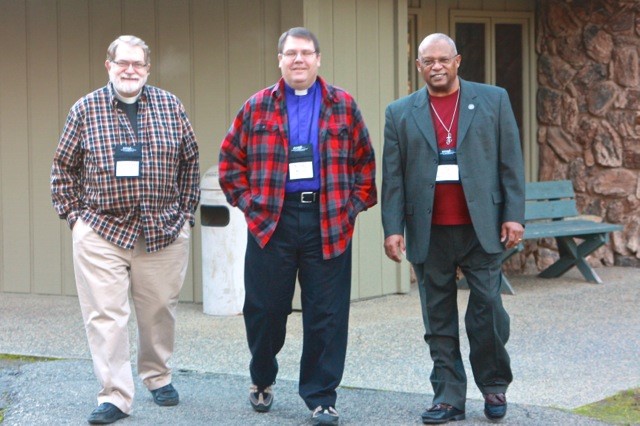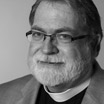But seek first his [God’s] kingdom and his righteousness and all these things will be given to you as well (Matthew 6:33)
As I was reading this verse this morning, I was struck by John Stott’s commentary:
“Instead of being preoccupied with material things, the followers of Jesus are to seek first God’s kingdom and God’s righteousness. To seek God’s kingdom is to proclaim Christ as King, so that people will submit to his rule. To seek God’s righteousness is to remember that God loves righteousness and hates evil, so that, even outside the circle of the kingdom, justice is more pleasing to God than injustice, freedom than oppression, and peace than violence and war. In this double ambition our evangelistic and social responsibilities are combined, and the glory of God becomes our supreme concern.” Through the Bible Through the Year (Baker: 2006) at 197.
I have just returned from the Anglican Church in North America (ACNA) Diocese of San Joaquin where over two consecutive weekends we held our American Anglican Coucil Lay Leadership Institute for 115 vestry leaders, wardens and their clergy. Our purpose was to help lay leaders develop new vision and new mission to “jump” the church life-cycle of recline and decline—to begin new “life-cycles” or seasons of incline, of growth in evangelism, discipleship and mission. I want to thank Bishop Eric Menees for the invitation, all those who participated, and especially those lay leaders who assisted in the presentations on the Biblical call to lay leadership, the spiritual leadership of the vestry, and faithfulness in church finances. I thank God that these meetings had immediate impact—specifically, several people told me how they learned principles they could take home and apply in their own church context. I am grateful for Bishop Menees who wrote afterwards “all of the feedback has been very positive.”
As I reflected on these weekends in light of Matthew 6:33 and John Stott’s commentary, I realize that this “double ambition” is at the heart of remissioning our Anglican churches and the leaders (lay and clergy) who serve them. As we look at the biblical pattern of church growth in Acts 2:42-47, “the glory of God becomes our chief concern,” and numerical growth may be the very last thing which shows up—just as it did in Acts 2. It’s all about Jesus Christ, and introducing people not only to his person and salvation, but also to the Kingdom and the power that he inaugurates. In the words of the late Dallas Willard, our mission is to introduce people to life in the Kingdom, “to the range of God’s effective will—where what God wants done is done.” We introduce people to such a biblical understanding of discipleship: that it is literally living our lives as Jesus would if he were in our shoes, our context.

But if that is the vertical dimension of fresh vision, the horizontal dimension must include an equal love for God’s righteousness. So in reframing both the challenges that keep our churches from growing, and the need for fresh vision, we challenge ourselves to ask difficult questions of our vision and mission. When we ask “How does God want to express himself through my church in this community in 2015?” are we also including that horizontal dimension of working for justice, freedom and peace in the communities God has placed us “even outside the circle of the kingdom”? Does the fresh vision and mission include shelter for the homeless, food for the hungry, refuge and counsel for the abused [see the article below on why you should not see 50 Shades of Grey], good replacement housing for lower income folks displaced by gentrification in urban neighborhoods, tutoring for “at-risk” children in our public schools, and help in finding jobs for the unemployed and under-employed?
One of the tragedies I have observed in the Church is that one ambition will be chosen at the expense of the other. Under the challenge of preaching the Gospel afresh in every generation, some church leaders will compromise the integrity and truth of the gospel for the sake of cultural relevance. So it is no longer about Jesus, it is about justice, period. Other leaders facing the same pressures will retreat from the culture in order to preserve the truth of the Gospel and focus only on “the circle of the Kingdom,” to the exclusion of those outside. In our exodus from false teaching in TEC, other places in the Anglican Communion and our culture, I worry that we may lose our equal ambition for God’s righteousness, his concern for those outside the circles we enjoy. If the rock on which Jesus builds his church is Peter’s confession “You are the Christ, the Son of the living God!,” and the gates of Hell shall not be able to stand against that confession, that “rock,” (Matthew 16:15-18), what are WE doing to remove the gates of Hell in our community at this time?
At the same time, adjustment of the Gospel to the unbiblical values of the culture leaves us with neither salvation through Christ alone and the presence of his Kingdom, nor justice. Without the authority of God’s word, even “justice” becomes a moving target for whatever is politically and culturally correct. So, for example, while I applaud the Archbishop of Canterbury’s address to the Church of England General Synod in which he states that the gospel of Jesus Christ is “good news for all people at all times everywhere,” and that the church must get on with bearing witness to Jesus Christ for the conversion of England. Bravo. But if the report of conversations leaked by the LGBTI group Changing Attitudes is true, it would appear that the Archbishop of Canterbury is planning for the Church of England to fracture over the disagreements around the Pilling Report, the definition of marriage, and whether or not the Church of England will find a way to bless same sex marriages or civil partnerships. This report suggested a fracture would lead to 20% of the church leaving “at both ends of the spectrum,” presumably 10% on the right and 10% on the left of the issues. From this North American’s viewpoint (and in the words of one of my favorite theologians, Yogi Berra) “It’s déjà vu all over again!” We had “facilitated conversations” about these issues too. We had people try to make a biblical case (unsuccessfully) for same sex relationships and blessings. We had a fracture—and yes, the disagreement was not good. But the fracture was not on either end of the spectrum. Those who left were certainly Christ focused Anglicans who were and remain with the majority of Anglicans worldwide in regard to these issues—and who assert both the priority of Jesus Christ and justice under the authority of the Bible, over and against culture.
So this makes me wonder… In reality, if 20% leave the Church of England as planned, will these not be the very people who would likely have embraced and fervently supported Canterbury’s desire for the re-evanglization of England? Are not the ones who are likely to leave those who will do so precisely because they do believe that the same word of God that exalts Jesus Christ as Lord and the imperative of the Great Commission (Matthew 28:16-20) to make disciples also demands that we submit everything to the authority of God’s word written. Everything—including our identity, marriage and our definitions of justice. Will he find, as we did, that those who are left will fight him tooth and nail on such re-evangelization precisely because theologically they do not believe that Jesus Christ and his word are good news for all people at all times everywhere?
If there is anything Matthew 6:33 and Stott’s commentary remind us, it is that these two ambitions are one piece, indivisible. The whole gospel for the whole person. There is no justice apart from Jesus Christ as Lord of all, and where Jesus Christ is Lord of all, there will be a passion for God’s righteousness, justice, freedom and peace.
The Rev. Canon Phil Ashey is Chief Executive Officer of the American Anglican Council.



